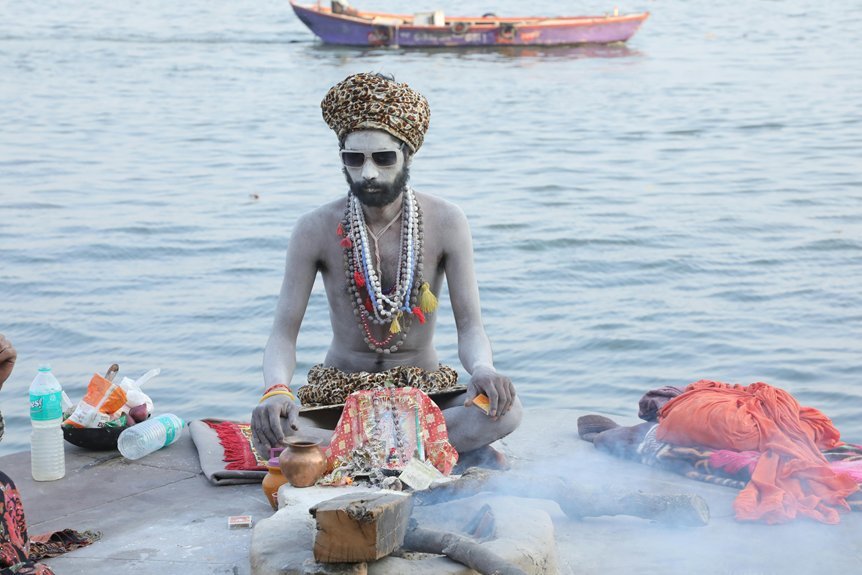Some might think Sant Tukaram’s teachings are only relevant to those with a deep religious background, but his insights on love, humility, and social justice resonate universally. His life story and poetic expressions, particularly his Abhangas, reveal a profound connection to the divine that transcends traditional rituals. Exploring his philosophy can illuminate your understanding of personal spirituality and community harmony. What can his legacy teach us in today’s world?
Key Takeaways
- Sant Tukaram was a 17th-century saint from Dehu, Maharashtra, known for his devotional poetry called Abhangas.
- His spiritual journey emphasized personal connection with the divine, advocating love and compassion over rituals.
- Tukaram’s Abhangas reflect profound philosophical insights and are significant in Marathi literature and spirituality.
- His teachings focus on surrendering to God and seeking inner peace, promoting social justice and humility.
- Tukaram’s legacy continues to inspire communities, fostering spiritual growth and harmony across generations.
Early Life and Background
Although details about Sant Tukaram’s early life remain somewhat obscure, historical accounts suggest he was born in the early 17th century in the village of Dehu, near Pune, in Maharashtra, India.
His childhood experiences likely shaped his character and values, reflecting the socio-religious dynamics of his time. Family influence played a vital role; his father was a successful merchant, instilling a sense of responsibility and resilience.
You might find it significant that his mother’s devotion to spirituality likely impacted his early worldview, setting the stage for his later philosophical developments. Understanding these elements offers insight into his formative years.
Spiritual Journey and Devotion

As Sant Tukaram grew from his formative years in Dehu, his spiritual journey began to take shape, deeply influenced by the socio-religious environment around him.
You’d notice that his commitment to spiritual practices, including meditation and worship, became increasingly profound. He engaged deeply with the teachings of the saints and embraced a life of devotion.
His creation of devotional songs, or Abhangas, reflected his inner experiences and devotion to Lord Vithoba. These songs served not only as expressions of personal faith but also as tools for community engagement, inspiring others to pursue their own spiritual paths through devotion and love.
Literary Contributions and Abhangas
Sant Tukaram’s literary contributions, particularly his Abhangas, stand as a demonstration of his profound spiritual insight and artistic expression.
Sant Tukaram’s Abhangas showcase his deep spiritual insight and artistic brilliance, enriching Marathi literature and devotion.
These devotional poems, characterized by their unique poetic style, explore deep into themes of devotion and the divine. In your Abhanga analysis, you’ll notice the rhythmic quality and emotional depth that resonate with readers.
His ability to convey complex spiritual ideas in simple, relatable language sets him apart. Each Abhanga serves not only as a prayer but also as a reflection of societal issues.
Consequently, Tukaram’s work remains a crucial component of Marathi literature and spirituality, inspiring generations.
Philosophy and Teachings
Tukaram’s Abhangas not only reflect his artistic prowess but also serve as a window into his philosophical beliefs and teachings.
You’ll find that his works emphasize the importance of devotional practices, encouraging a personal connection with the divine. Through simple yet profound verses, Tukaram imparts spiritual insights that challenge materialism and promote humility.
He advocates for surrendering to God, suggesting that true devotion transcends rituals and dogma. His teachings encourage you to seek inner peace and enlightenment, fostering a sense of unity among all living beings.
Fundamentally, Tukaram’s philosophy inspires a life rooted in love, compassion, and spiritual awakening.
Legacy and Influence on Future Generations
While many spiritual leaders have left their mark on history, Tukaram’s legacy continues to resonate deeply within contemporary society. His Abhanga poetry and devotion to Lord Vithoba have had a significant cultural impact, inspiring countless artists, musicians, and thinkers.
You’ll find that his teachings emphasize love, humility, and social justice, which remain relevant today. This enduring relevance allows his message to transcend time, uniting diverse communities in shared values.
As you explore his influence, you’ll see how Tukaram’s ideals foster spiritual growth and promote harmony, ensuring that his legacy endures in future generations, shaping the moral fabric of society.
Conclusion
To summarize, Sant Tukaram’s life and teachings shine like a beacon of light, guiding seekers toward spiritual fulfillment and social harmony. His Abhangas not only reflect his deep devotion but also resonate with universal themes of love and humility. As you explore his legacy, you’ll find that his messages transcend time, encouraging you to forge a personal connection with the divine and engage in meaningful acts of compassion within your community. His influence remains an essential force today.


